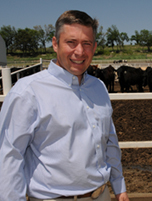Call for better cattle care
Symposium to emphasize benefits of humane treatment
Treating cattle humanely is not only right, it's also good for producers' bottom line. Dan Thomson leads the Beef Cattle Institute, which is attracting worldwide attention for its International Beef Symposium on Beef Cattle Welfare May 28-30 at K-State. A pre-symposium session will be offered May 28 on cattle welfare through proper handling.
 "Animal welfare is animal husbandry," Thomson said. "Abusive behavior toward animals is not the norm and should not be tolerated."
"Animal welfare is animal husbandry," Thomson said. "Abusive behavior toward animals is not the norm and should not be tolerated."
Before joining the K-State faculty, Thomson, pictured at left, worked in the livestock industry.
"No one cares about their cattle more than the person who gets up at 5 a.m. to care for them," Thomson said. "The better the welfare or husbandry of cattle, the better they perform.
"With this symposium, we want people to have a better understanding of beef cattle welfare guidelines from around the world," Thomson said. "We are very excited about the diverse group of registrants."
The symposium is an effort to bring researchers together with producers. The industry/academia interface is essential for both groups to move forward in the interest of the beef industry, Thomson said. The mission of this symposium is to understand the strides that have been made for the welfare of cattle and discuss opportunities for improvement.
More than 300 people are registered, and more are signed up for the Webinar, which will send the symposium over the Internet. Scientists, producers and cattle associations from many countries are participating.
A presentation on cattle welfare through proper handling will highlight concepts that help producers create positive relationships with cattle, Thomson said.
The presentation and demonstration will include video footage and cattle handling in an arena, complete with processing facilities. Herd health checks, proper nutrition and effective handling will improve the industry for all, Thomson said.
Speakers are to include producers, nutritionists and veterinarians. The list also includes federal policy-makers and representatives from professional societies and commodity groups. Lead researchers from around the globe will discuss current findings and future needs. For more information, visit http://www.isbcw.beefcattleinstitute.org/
Photo by Dave Adams